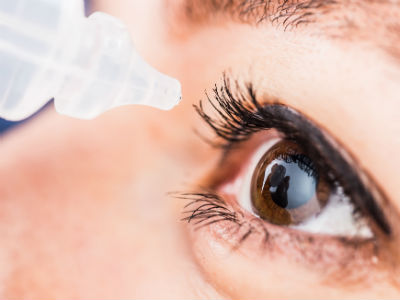 You know the feeling – everything stops when you get something in your eye. Rubbing and blinking over and over to create tears to get the foreign object out of the eye. Imagine dealing with the feeling of a spec of dust, or stinging, itchy and uncomfortable eyes every day. It is a common, often chronic problem called dry eye. The condition is not curable, but measures can be taken to lessen the eye’s sensitivity and maintain the health of the eyes.
You know the feeling – everything stops when you get something in your eye. Rubbing and blinking over and over to create tears to get the foreign object out of the eye. Imagine dealing with the feeling of a spec of dust, or stinging, itchy and uncomfortable eyes every day. It is a common, often chronic problem called dry eye. The condition is not curable, but measures can be taken to lessen the eye’s sensitivity and maintain the health of the eyes.
People with dry eyes either do not produce enough tears or they produce poor quality tears. Tear production tends to diminish with age. Medical conditions and some medications such as antihistamines, antidepressants, and oral contraceptives can affect tear production as well. In addition, environmental conditions, such as windy and dry climates, and exposure to smoke can increase the development of dry eye symptoms. Sometimes the quantity of tears is okay, but the quality, or composition, of the tears is poor. Tears are made up of a layer of oil, water, and mucus. The oil helps prevent the water from evaporating, while the mucus spreads the tears evenly over the surface of the eye. They each have an important role in protecting and nourishing the eye. If any of the three components are deficient, dry eye symptoms can develop.
As with any health check-up, it is important to tell your eye doctor about any and all symptoms you are having with your eyes. Your symptoms and/or medications you are taking, and your work or home environment may prompt your doctor to perform dry eye testing. With the use of special dyes and a highly magnified view of your eyes, your eye doctor can evaluate the quality, quantity, and distribution of your tears.
The severity of the dry eye will determine the course of treatment. The most frequent treatment is the use of tear substitutes. Gels or ointments may be used for more severe dry eye.
Left untreated, dry eye can be harmful. Excessive dryness can damage tissue and possibly scar the cornea of your eye which would impair vision. Wearing contact lenses is also difficult with dry eye because the increased irritation can lead to an infection. Working with your eye doctor and following the prescribed treatment will soothe and protect the eyes to make them healthier.